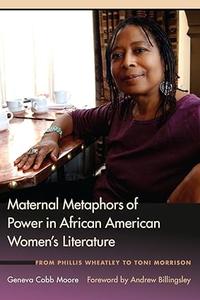|
View: 1206|Reply: 0
|
[Books & Magazine]
Maternal Metaphors of Power in African American Women's Literature From Phillis Wheatley to Toni Morrison
[Copy link]
|
|
|

Free Download Geneva Cobb Moore, Andrew Billingsley, "Maternal Metaphors of Power in African American Women's Literature: From Phillis Wheatley to Toni Morrison"
English | 2017 | ISBN: 1611177480 | EPUB | pages: 376 | 0.8 mb
An in-depth examination of Black women's experiences as portrayed in literature throughout American history
Geneva Cobb Moore deftly combines literature, history, criticism, and theory in Maternal Metaphors of Power in African American Women's Literature by offering insight into the historical black experience from slavery to freedom as depicted in the literature of nine female writers across several centuries.
Moore traces black women writers' creation of feminine and maternal metaphors of power in literature from the colonial-era work of Phillis Wheatley to the postmodern efforts of Paule Marshall, Alice Walker, and Toni Morrison. Through their characters Moore shows how these writers re-created the identity of black women and challenge existing rules shaping their subordinate status and behavior. Drawing on feminist, psychoanalytic, and other social science theory, Moore examines the maternal iconography and counter-hegemonic narratives by which these writers responded to oppressive conventions of race, gender, and authority.
Moore grounds her account in studies of Wheatley, Harriet Jacobs, Charlotte Forten Grimké, Jessie Fauset, Nella Larsen, and Zora Neale Hurston. All these authors, she contends, wrote against invisibility and powerlessness by developing and cultivating a personal voice and an individual story of vulnerability, nurturing capacity, and agency that confounded prevailing notions of race and gender and called into question moral reform.
In these nine writers' construction of feminine images―real and symbolic―Moore finds a shared sense of the historically significant role of black women in the liberation struggle during slavery, the Jim Crow period, and beyond.
A foreword is offer by Andrew Billingsley, a pioneering sociologist and a leading scholar in African American studies.
Links are Interchangeable - Single Extraction |
|
|
|
|
|
|
|
|
|
| |
Category: Shop Online/Classified
|